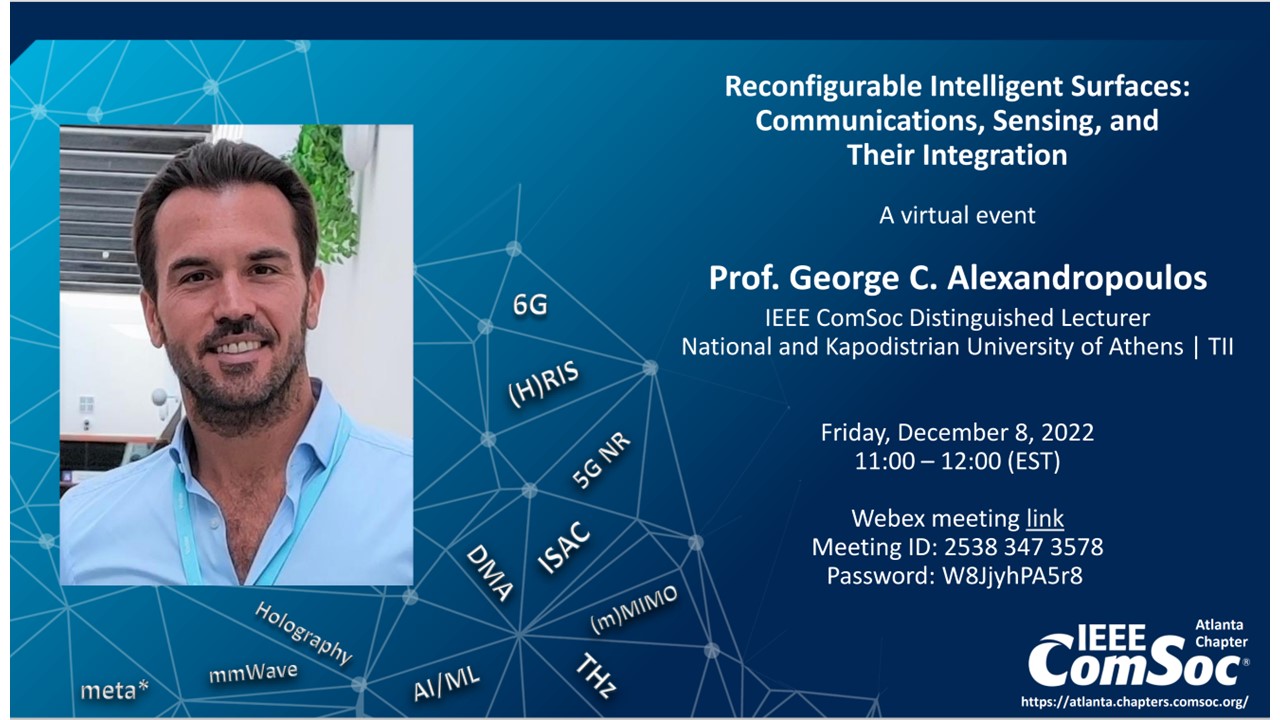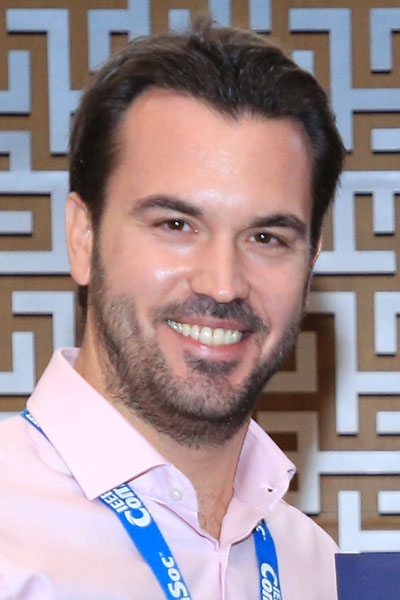Algorithms & protocols joint coms, localization, sensing by Dr. George Alexandropoulos

Title: Reconfigurable intelligent surfaces: Communications, sensing, and their integration
Abstract: The advent of the connected things paradigm within 5G wireless communications enabled various sophisticated applications, whose evolution paves the way for the notion of the connected intelligence of everything in 6G networks. Recent speculations for this upcoming new generation push the 5G performance indicators to unprecedented levels, envisioning THz frequency bands, devices with embedded sensing capabilities, and native AI. All these are expected to become a reality around 2030 and with a strong green footprint. In this talk, we will elaborate around the emerging technology of Reconfigurable Intelligent Surfaces (RISs) which is provisioned as the enabler of smart wireless environments, offering a highly scalable, low-cost, hardware-efficient, and almost energy-neutral solution for the dynamic control of the propagation of electromagnetic signals. We will discuss their evolution from programmable reflecting metamaterials to connected computational- and power-autonomous hybrid metasurfaces, emphasizing on the state-of-the-art approaches for RIS-empowered communications, localization, and sensing.
Short Biography: George C. Alexandropoulos received the Engineering Diploma, M.A.Sc., and Ph.D. degrees in Computer Engineering and Informatics from the School of Engineering, University of Patras, Greece in 2003, 2005, and 2010, respectively. He has held research positions at various Greek universities and research institutes, as well as at the Mathematical and Algorithmic Sciences Lab, Paris Research Center, Huawei Technologies France, and he is currently an Assistant Professor with the Department of Informatics and Telecommunications, School of Sciences, National and Kapodistrian University of Athens (NKUA), Greece. He also serves as a Principal Researcher for the Technology Innovation Institute, Abu Dhabi, United Arab Emirates. His research interests span the general areas of algorithmic design and performance analysis for wireless networks with emphasis on multi-antenna transceiver hardware architectures, active and passive Reconfigurable Intelligent Surfaces (RISs), integrated communications and sensing, millimeter wave and THz communications, as well as distributed machine learning algorithms. He currently serves as an Editor for IEEE Transactions on Communications, IEEE Wireless Communications Letters, ELSEVIER Computer Networks, Frontiers in Communications and Networks, and the ITU Journal on Future and Evolving Technologies. In the past, he has held various fixed-term and guest editorial positions for IEEE Transactions on Wireless Communications and IEEE Communications Letters, as well as for various special issues at IEEE journals. Prof. Alexandropoulos is a Senior Member of the IEEE Communications, Signal Processing, and Information Theory Societies, the vice-chair of the EURASIP Technical Area Committee on Signal Processing for Communications and Networking, as well as a registered Professional Engineer of the Technical Chamber of Greece. He is also a Distinguished Lecturer of the IEEE Communications Society. He has participated and/or technically managed more than 15 European Union (EU), international, and Greek research, innovation, and development projects. He is currently NKUA's principal investigator for the EU H2020 RISE‑6G and the SNS JU TERRAMETA projects dealing with RIS-empowered smart wireless environments and THz RISs, respectively. For the former project he also serves as the dissemination manager, whereas for the latter, he also serves as the project’s technical manager. Prof. Alexandropoulos has received the best Ph.D. thesis award 2010, the IEEE Communications Society Best Young Professional in Industry Award 2018, the EURASIP Best Paper Award of the Journal on Wireless Communications and Networking 2021, the IEEE Marconi Prize Paper Award in Wireless Communications 2021, and a Best Paper Award from the IEEE GLOBECOM 2021. More information is available at www.alexandropoulos.info.
Date and Time
Location
Hosts
Registration
-
 Add Event to Calendar
Add Event to Calendar
Loading virtual attendance info...
- Contact Event Hosts
- Co-sponsored by Tamseel Mahmood - syed.tamseel@ieee.org
Speakers
 Dr. Alexandropoulos of University of Athens
Dr. Alexandropoulos of University of Athens
Reconfigurable intelligent surfaces: Communications, sensing, and their integration
Abstract: The advent of the connected things paradigm within 5G wireless communications enabled various sophisticated applications, whose evolution paves the way for the notion of the connected intelligence of everything in 6G networks. Recent speculations for this upcoming new generation push the 5G performance indicators to unprecedented levels, envisioning THz frequency bands, devices with embedded sensing capabilities, and native AI. All these are expected to become a reality around 2030 and with a strong green footprint. In this talk, we will elaborate around the emerging technology of Reconfigurable Intelligent Surfaces (RISs) which is provisioned as the enabler of smart wireless environments, offering a highly scalable, low-cost, hardware-efficient, and almost energy-neutral solution for the dynamic control of the propagation of electromagnetic signals. We will discuss their evolution from programmable reflecting metamaterials to connected computational- and power-autonomous hybrid metasurfaces, emphasizing on the state-of-the-art approaches for RIS-empowered communications, localization, and sensing.
Biography:
George C. Alexandropoulos received the Engineering Diploma, M.A.Sc., and Ph.D. degrees in Computer Engineering and Informatics from the School of Engineering, University of Patras, Greece in 2003, 2005, and 2010, respectively. He has held research positions at various Greek universities and research institutes, as well as at the Mathematical and Algorithmic Sciences Lab, Paris Research Center, Huawei Technologies France, and he is currently an Assistant Professor with the Department of Informatics and Telecommunications, School of Sciences, National and Kapodistrian University of Athens (NKUA), Greece. He also serves as a Principal Researcher for the Technology Innovation Institute, Abu Dhabi, United Arab Emirates. His research interests span the general areas of algorithmic design and performance analysis for wireless networks with emphasis on multi-antenna transceiver hardware architectures, active and passive Reconfigurable Intelligent Surfaces (RISs), integrated communications and sensing, millimeter wave and THz communications, as well as distributed machine learning algorithms. He currently serves as an Editor for IEEE Transactions on Communications, IEEE Wireless Communications Letters, ELSEVIER Computer Networks, Frontiers in Communications and Networks, and the ITU Journal on Future and Evolving Technologies. In the past, he has held various fixed-term and guest editorial positions for IEEE Transactions on Wireless Communications and IEEE Communications Letters, as well as for various special issues at IEEE journals. Prof. Alexandropoulos is a Senior Member of the IEEE Communications, Signal Processing, and Information Theory Societies, the vice-chair of the EURASIP Technical Area Committee on Signal Processing for Communications and Networking, as well as a registered Professional Engineer of the Technical Chamber of Greece. He is also a Distinguished Lecturer of the IEEE Communications Society. He has participated and/or technically managed more than 15 European Union (EU), international, and Greek research, innovation, and development projects. He is currently NKUA's principal investigator for the EU H2020 RISE‑6G and the SNS JU TERRAMETA projects dealing with RIS-empowered smart wireless environments and THz RISs, respectively. For the former project he also serves as the dissemination manager, whereas for the latter, he also serves as the project’s technical manager. Prof. Alexandropoulos has received the best Ph.D. thesis award 2010, the IEEE Communications Society Best Young Professional in Industry Award 2018, the EURASIP Best Paper Award of the Journal on Wireless Communications and Networking 2021, the IEEE Marconi Prize Paper Award in Wireless Communications 2021, and a Best Paper Award from the IEEE GLOBECOM 2021. More information is available at www.alexandropoulos.info.

